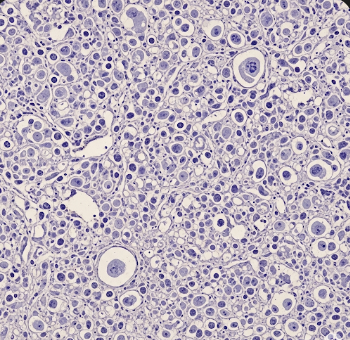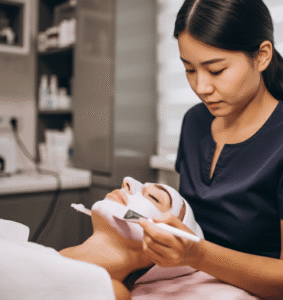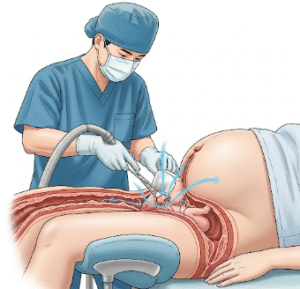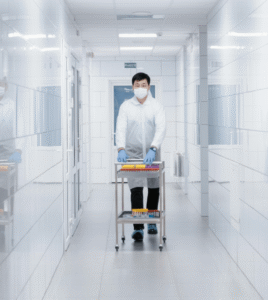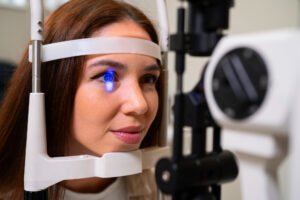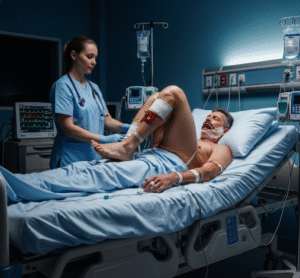Overview
Burkitt Lymphoma (BL) is a rare, aggressive form of non-Hodgkin’s lymphoma that primarily affects B-lymphocytes, a type of white blood cell responsible for immune response. It is characterized by rapid tumor growth, often in the jaw, abdomen, or other organs, and requires urgent medical attention due to its aggressive nature.
In Korea, Burkitt Lymphoma is treated in specialized oncology centers using advanced chemotherapy protocols, targeted therapies, and supportive care. Early diagnosis and prompt treatment are crucial for improving survival rates and minimizing complications.
What is Burkitt Lymphoma?
Burkitt Lymphoma is a high-grade B-cell lymphoma that can present in several forms:
- Endemic form: Common in regions with high malaria prevalence, often affecting the jaw and facial bones
- Sporadic form: Occurs worldwide, frequently involving the abdomen
- Immunodeficiency-associated form: Seen in patients with HIV/AIDS or post-transplant immunosuppression
It is characterized by rapidly growing tumors that can double in size in just 24–48 hours. The disease is associated with genetic abnormalities, particularly translocations involving the MYC gene, which drive uncontrolled cell growth.
Symptoms
Symptoms of Burkitt Lymphoma depend on tumor location and the speed of progression:
- Swelling or mass in the jaw, face, or abdomen
- Abdominal pain or distension, often due to tumor involvement of the intestines
- Enlarged lymph nodes, typically painless
- Fever, night sweats, and unexplained weight loss (B symptoms)
- Fatigue and weakness from anemia or rapid tumor growth
- Nausea or vomiting, especially with abdominal involvement
- Neurological symptoms if tumors compress nerves or the central nervous system
The aggressive nature of Burkitt Lymphoma means symptoms can develop suddenly and progress rapidly, necessitating urgent medical evaluation.
Causes
Burkitt Lymphoma arises from a combination of genetic, viral, and immunological factors:
- Genetic translocations involving the MYC gene, which drive uncontrolled B-cell proliferation
- Epstein-Barr Virus (EBV) infection, particularly in endemic cases
- Immunodeficiency, including HIV infection or immunosuppressive therapy
- Chronic immune stimulation, such as malaria or other infections in endemic regions
While the exact cause varies by subtype, these factors disrupt normal B-cell regulation, leading to rapidly dividing malignant cells.
Risk Factors
- Age: Common in children and young adults, though adults can be affected
- Geographic location: Endemic in sub-Saharan Africa and certain malaria-prone regions
- Viral infections, particularly Epstein-Barr Virus
- Immunodeficiency, including HIV/AIDS or post-transplant immunosuppression
- Family history of lymphoma or other blood cancers
Complications
Due to its aggressive progression, Burkitt Lymphoma can lead to serious complications:
- Tumor lysis syndrome, a potentially life-threatening condition caused by rapid breakdown of cancer cells
- Obstruction of organs, such as intestines or airways, leading to pain, vomiting, or respiratory distress
- Bone marrow involvement, causing anemia, infections, and bleeding disorders
- Central nervous system involvement, leading to neurological symptoms such as headaches, seizures, or cranial nerve deficits
- Relapse or refractory disease, which can be challenging to treat
Prevention
While Burkitt Lymphoma cannot be fully prevented, certain strategies may reduce risk or enable early detection:
- Monitoring individuals with immunodeficiency, including HIV-positive patients or transplant recipients
- Regular medical check-ups for patients with EBV infection or chronic immune stimulation
- Prompt treatment of infections that may predispose to immune system dysregulation
- Awareness of early symptoms, particularly rapidly enlarging lumps or unexplained weight loss
Treatment Options in Korea
Diagnosis
Diagnosis involves clinical evaluation, imaging, and laboratory studies:
- Physical examination to identify enlarged lymph nodes or masses
- Blood tests, including complete blood count, liver and kidney function, and LDH levels
- Imaging studies, such as CT, MRI, or PET scans to assess tumor location and spread
- Biopsy of affected tissue, followed by histopathological and immunophenotypic analysis
- Genetic testing to detect MYC translocations and other chromosomal abnormalities
Medical Management
Burkitt Lymphoma is highly responsive to aggressive chemotherapy:
- Intensive combination chemotherapy, including regimens such as CODOX-M/IVAC or Hyper-CVAD
- Intrathecal chemotherapy to prevent or treat central nervous system involvement
- Targeted therapies, including monoclonal antibodies like rituximab, often combined with chemotherapy
- Supportive care, including hydration, electrolyte management, and infection prophylaxis
Advanced Therapies
- Stem cell transplantation in select high-risk or relapsed patients
- Clinical trials for novel immunotherapies and targeted molecular treatments
- Multidisciplinary care, integrating oncology, hematology, and supportive medicine
Supportive Care
- Management of tumor lysis syndrome through intensive monitoring, hydration, and medications
- Pain management for tumor-related discomfort
- Nutritional support to maintain weight and strength during intensive therapy
- Psychosocial support for patients and families, including counseling and rehabilitation services
Prognosis
The prognosis of Burkitt Lymphoma depends on early diagnosis, tumor stage, and treatment response:
- Children and young adults generally have high cure rates with intensive chemotherapy
- Adults may have slightly lower survival rates, particularly in advanced disease
- Prompt treatment in Korean oncology centers significantly improves outcomes
- Relapsed or refractory cases require advanced therapies and may have a more guarded prognosis
- Long-term follow-up is essential to monitor for recurrence, late complications, and secondary malignancies
With rapid intervention, comprehensive chemotherapy, and supportive care, Burkitt Lymphoma in Korea can be effectively treated, providing patients with a favorable chance of remission and long-term survival.

